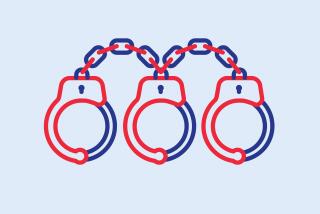State High Court Eases Standard for Using Confessions as Evidence
- Share via
SAN FRANCISCO — The state Supreme Court, in another expansion of the 1982 anti-crime initiative, eased the way Monday for prosecutors to show that a defendant’s confession was voluntary and thus should be admitted as evidence.
The justices held that under Proposition 8, also known as the “victims’ bill of rights,” the state must abandon a more restrictive state standard for the admissibility of evidence in favor of a less restrictive federal rule adopted by the U.S. Supreme Court.
The state court unanimously set aside a 1978 ruling issued under then-Chief Justice Rose Elizabeth Bird that had required the prosecution to prove a confession or a waiver of the right to remain silent was voluntary “beyond a reasonable doubt”--the same standard required for a conviction.
Under the initiative, the court said Monday, the voluntary nature of a confession need only be shown by a “preponderance of evidence,” the federal constitutional standard for confessions established by the U.S. Supreme Court 17 years ago.
“The intent of the electorate in passing Proposition 8 was to curtail the exclusion of relevant evidence based on independent state grounds,” Justice David N. Eagleson wrote for the court.
In a separate opinion, Justice Stanley Mosk reluctantly agreed with the decision, but went on to assail the 1982 initiative as an “ill-conceived measure” responsible for “a path of destruction” that has invalidated a string of state court rulings that had extended individual rights beyond those required under the federal Constitution.
Last year, the court invoked the initiative to overturn a 1976 ruling and held that improperly obtained confessions could still be used to challenge a defendant’s testimony at trial, as permitted by the U.S. Supreme Court. In 1985, the justices held that the initiative required state courts to follow federal standards on the admissibility of evidence from illegal searches.
“In Asia, Latin America and other areas of this troubled world courageous men and women are striving, and some are dying, to establish and expand individual rights,” wrote Mosk. “It is ironic that in California our existing individual rights are being curtailed.”
Kenneth J. Sargoy of Los Angeles, attorney for the defendant in the case, Jerome Joseph Markham, said the ruling went beyond the intent of the voters and would encourage police coercion of criminal suspects.
“We’re probably out of the rubber-hose era, but there are still subtle ways to coerce a confession--promises of leniency, veiled threats and so forth,” he said. “Police will take advantage of that with a standard that is much more lenient.”
Innocence Harder to Prove
Sargoy said that once a confession is admitted into evidence, it is difficult to persuade a jury that the defendant is innocent. “Now that we have a lesser standard for admitting confessions, we also have a lesser standard for determining guilt,” he said.
State Deputy Atty. Gen. William T. Harter disputed the suggestion that the ruling would invite coercion and pointed out that even when a confession is admitted, the defendant still may contend at trial that it was involuntary.
“The jury can still decide they don’t believe the confession,” Harter said.
Markham was accused of joining another man to rob a drug store in Oxnard in June, 1984. When he was arrested the day after the crime, Markham was warned by police of his right to remain silent and to have a lawyer, as required by the U.S. Supreme Court in its landmark 1966 ruling of Miranda vs. Arizona.
According to police, Markham waived those rights and went on to admit joining in the robbery. But before trial, Markham sought to bar admission of the confession as involuntary, contending he had been under the influence of drugs and had been exploited by his interrogator.
A police detective acknowledged that Markham appeared to have been taking drugs, but maintained that he fully understood his rights and made his statements voluntarily.
A Ventura County magistrate ruled that, under Proposition 8, the federal standard for deciding the issue should apply and that the prosecution had shown the confession was voluntary by a preponderance of the evidence. Had the stricter 1978 standard applied, the magistrate said, the confession would have been barred as evidence.
In an appeal to the high court, attorneys for Markham noted that 11 other states had rejected the federal preponderance standard in favor of the more demanding rule adopted by California in 1978. The tougher standard, they said, reduced the chances of either a forced or false confession, and should remain in effect.
More to Read
Sign up for Essential California
The most important California stories and recommendations in your inbox every morning.
You may occasionally receive promotional content from the Los Angeles Times.













